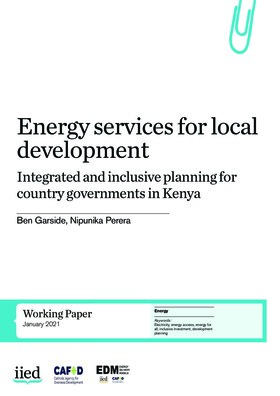To realise the full benefits of energy as an enabler of different development objectives across sectors more inclusive and integrated approaches are needed. The Energy Delivery Model (EDM) - a planning approach developed by the International Institute of Environment and Development (IIED) and the Catholic Agency for Overseas Development (CAFOD) – builds on research and practitioner experience of designing energy services at the community level. It is a problem-solving, participatory approach that uses a six-step process to identify and differentiate the priority needs of different target groups and build understanding of the barriers and enabling factors related to the local context. EDM identifies the ‘gaps’ preventing the needs being met (relating to both energy and other ‘non-energy’ factors), and develops solutions or delivery models to address them that are financially, environmentally and socially sustainable.
This working paper is based on the EDM Toolkit, first published in 2017, an innovative technical approach for inclusive and integrated energy planning for local governments. In 2018 IIED and CAFOD, with local partners Caritas Kitui and the Kitui County government in Kenya, applied EDM in Kitui to develop investment-ready solutions for the Kitui County Energy Plan (CEP). It focuses on the methodology used in developing the CEP rather than the proposed solutions as the CEP is still in draft form and yet to be finalized by the county government of Kitui.
